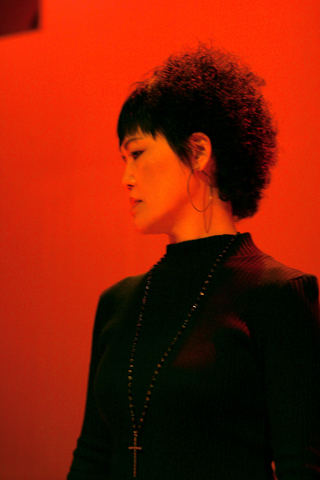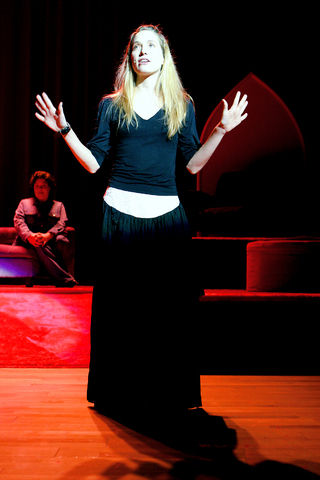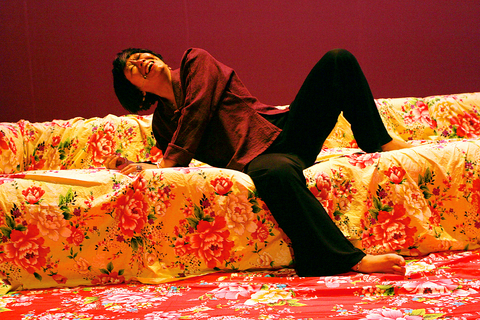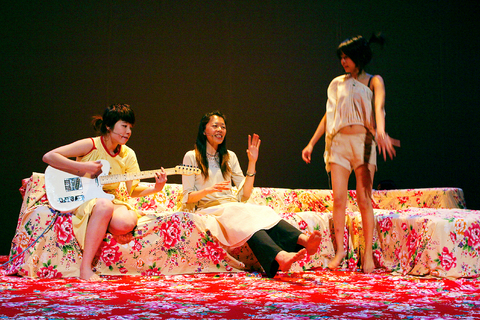When US playwright Eve Ensler first staged her award-winning play The Vagina Monologues in New York in 1997, she never thought that it would become a worldwide phenomenon and lead to the establishment of V-Day, an international movement intended to prevent violence against women and promote equality.
Nines years later, the V-Day campaigns enjoy widespread support from women's groups and organizations around the globe.
Last year, Canadian musician Dana Wylie got authorization to stage a benefit production of the play in Taiwan. She co-organized the performances with local women activists and theater talents and this week monologues about women's most intimate thoughts and emotions will take center stage at the Guoguang Hall of Chinese Petroleum Building.

PHOTOS COURTESY OF CHAU MUN WAI
There will be two performances, one in English, the other in Mandarin.
Following interviews conducted with 200 women about their life experiences, Eve Ensler completed the first draft of her script in 1996. Each monologue relates to the vagina and includes the chilling memory of a rape experience, violation, mutilation, masturbation, birth, menstruation and orgasm.
Ensler once said that the reason for her fascination with the vagina lies in her belief that the vagina is a tool of female empowerment.

The play has been a huge success in the US. Celebrities such as Glenn Close, Jane Fonda, Melanie Griffith, Kate Winslet, Whoopi Goldberg and Winona Ryder, have all sought out roles for performances.
Ensler revises the script each year by adding new monologues, so as to address different social issues on sexuality and gender, such as transsexual communities and women in Afghanistan.
This year's spotlighted theme is "Justice for Comfort Women" and aims to raise awareness of war crimes. Funds raised will aid organizations that cope with those women who have survived sexual abuse in wartime. The English and Mandarin productions in Taipei will incorporate the new piece on comfort women survivors so as to give the Taiwanese side of events, regarding the abuse by Japanese soldiers of local women in World War II.

The V-Day Taiwan team consists of volunteer activists and artists. One tenth of the proceeds raised from the event this year will go to the V-Day headquarters in the US, and the rest of the earnings will be donated to Taiwan Women's Link (台灣女人連線), Taipei Women's Rescue Foundation (台北市婦女救援基金會) and ECPAT Taiwan (台灣終止童妓協會).
Betsy Lan (
"V-Day headquarters in the US offers clear guidelines in regard how to organize and raise funds, but it also gives enough freedom to local communities and groups in different parts of the world to work out their own structures," Lan said.

When asked about her take on doing a performance in Taiwan using an American text, Lan said, "They [US V-Day] is aware of the fact that the script is essentially an American experience, so it encourages us to add local perspectives while performing so as to make global participation possible."
But to this year's director of the Mandarin performance Lu Hui-mian (
"The first time I read through the script, my reaction to it was quite contradictory. On one hand, the original text struck me as overly American. And from the feminist's point of view, the concepts it is based on comes from the the first-waves of the feminist movement in the 1960s. Even so, it is undeniable that the iniquities faced by women 40 years ago still exists in today's society," Lu said.

To Lu's mind, adapting a white woman's account of women's most private experiences requires conscious tactics to avoid overt Anglo-Saxon domination.
As such Lu has broken down the script by inserting a video clip after each monologue. The projected images show performers and the director discussing their own expe-riences and opinions on the script at the rehearsals, forming their own comments and critiques.
Lu said the form of interview the play is based on suggests a hidden power relation, where the interviewer has the authority to command the interviewees to answer the questions. As such the video clips also present performers making refutations and arguments with the interviewees to show different ideas and thinking.

As the last monologue of the two-hour play takes on the theme of comfort women, the Mandarin performance will invite a group of aged Taiwanese "comfort women" survivors to join the performers on stage and speak of their own experiences.
The English performance, on the other hand, will give the audience a chance to savor the original flavor of Ensler's script, with a troupe of foreign performers reciting stories about the vagina.
For your further information :

What: The Vagina Monologues
Where: Guoguang Hall at the Chinese Petroleum Building (中油大樓國光廳), 3, Songren Rd, Taipei (台北市松仁路3號).
When: Tonight at 7pm for Mandarin performance, tomorrow at 7pm for English performance
Tickets cost NT$500 and NT$1,000 for general public, NT$400 for students, available at the door
Purchases can also be made at the Witchhouse (女巫店) and White Wabbit Records (小白兔唱片行), or call (02) 2322 5038, (02) 2356 9595 or (02) 6610 6616 for reservations.

On a harsh winter afternoon last month, 2,000 protesters marched and chanted slogans such as “CCP out” and “Korea for Koreans” in Seoul’s popular Gangnam District. Participants — mostly students — wore caps printed with the Chinese characters for “exterminate communism” (滅共) and held banners reading “Heaven will destroy the Chinese Communist Party” (天滅中共). During the march, Park Jun-young, the leader of the protest organizer “Free University,” a conservative youth movement, who was on a hunger strike, collapsed after delivering a speech in sub-zero temperatures and was later hospitalized. Several protesters shaved their heads at the end of the demonstration. A

In August of 1949 American journalist Darrell Berrigan toured occupied Formosa and on Aug. 13 published “Should We Grab Formosa?” in the Saturday Evening Post. Berrigan, cataloguing the numerous horrors of corruption and looting the occupying Republic of China (ROC) was inflicting on the locals, advocated outright annexation of Taiwan by the US. He contended the islanders would welcome that. Berrigan also observed that the islanders were planning another revolt, and wrote of their “island nationalism.” The US position on Taiwan was well known there, and islanders, he said, had told him of US official statements that Taiwan had not

The term “pirates” as used in Asia was a European term that, as scholar of Asian pirate history Robert J. Antony has observed, became globalized during the European colonial era. Indeed, European colonial administrators often contemptuously dismissed entire Asian peoples or polities as “pirates,” a term that in practice meant raiders not sanctioned by any European state. For example, an image of the American punitive action against the indigenous people in 1867 was styled in Harper’s Weekly as “Attack of United States Marines and Sailors on the pirates of the island of Formosa, East Indies.” The status of such raiders in

As much as I’m a mountain person, I have to admit that the ocean has a singular power to clear my head. The rhythmic push and pull of the waves is profoundly restorative. I’ve found that fixing my gaze on the horizon quickly shifts my mental gearbox into neutral. I’m not alone in savoring this kind of natural therapy, of course. Several locations along Taiwan’s coast — Shalun Beach (沙崙海水浴場) near Tamsui and Cisingtan (七星潭) in Hualien are two of the most famous — regularly draw crowds of sightseers. If you want to contemplate the vastness of the ocean in true